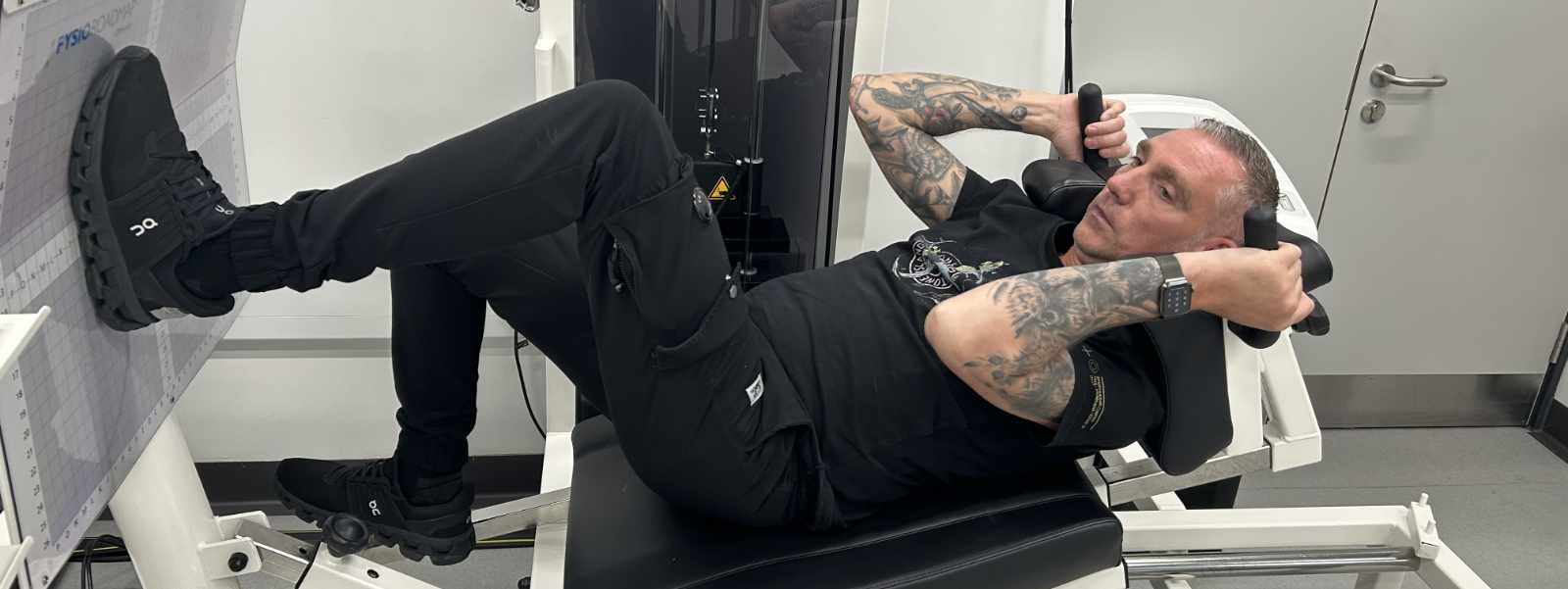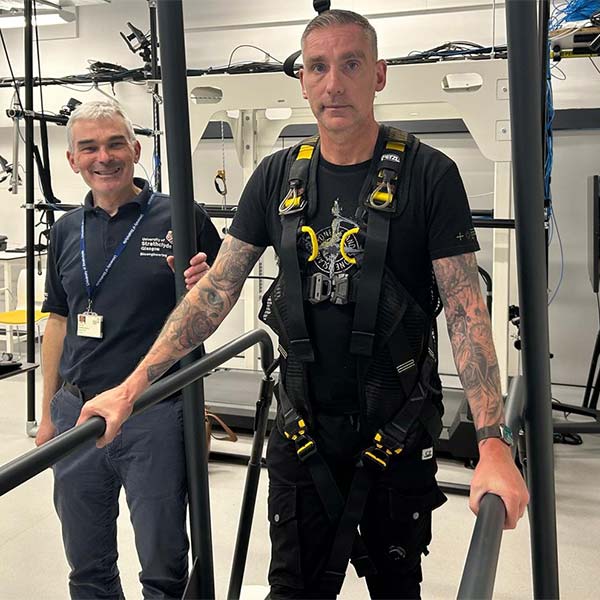
Stroke survivors in Scotland will benefit from three new specialist community gyms designed to improve their recovery and quality of life.
Launching later this year in South Lanarkshire, Edinburgh, and Dundee, the Technologically Enriched Rehabilitation Gyms (TERGs) aim to increase access to evidence-based levels of rehabilitation after stroke, providing vital support to patients following hospital discharge.
Located at Edinburgh Community Rehabilitation and Support Service, Blantyre Life in South Lanarkshire, and Olympia in Dundee, the staff will vary across the sites. In Edinburgh the gym will be staffed by care and support workers with oversight from therapists employed by the Edinburgh Health and Social Care Partnership. In Wishaw and Blantyre patients will be supported by NHS-trained assistant practitioners with oversight and support from therapists managed by South Lanarkshire University Health and Social Care Partnership. In Dundee the gyms will have specially trained fitness instructors.
Rehab sessions
Each gym will host eight-week programmes for groups of up to 10 people, offering two-hour rehabilitation sessions from two to five days a week. They are being rolled out following the success of the Sir Jules Thorn Co-Creation Centre for Rehabilitation Technology at the University of Strathclyde, which has already helped hundreds of stroke survivors with a cutting-edge, technology-driven approach.
The Centre has also been supported by Chest Heart and Stroke Scotland (CHSS) since 2022, with funding for two research assistants, who design and supervise the rehabilitation programme and manage the day-to-day operation of the centre.
The Strathclyde centre empowers users to take a self-managed approach to rehabilitation, a method shown to deliver better recovery outcomes. Participants have demonstrated improvements across various measures of function and quality of life, beyond physical mobility.
Staffing commitments
The project has been made possible thanks to additional funding of over £461,000, including a further £300,000 from the Sir Jules Thorn Charitable Trust and £161,492 from Chest Heart and Stroke Scotland, as well as staffing commitments from each of the host organisations.
A pilot study at University Hospital Wishaw, run by Strathclyde and the NHS, has also shown promising results for acute stroke patients. By offering this innovative rehabilitation within the hospital, patients received up to three times more therapy than traditional methods. Due to its success, this programme has now been integrated into ongoing NHS service provision.
Dr Andrew Kerr from the University of Strathclyde, who leads the project, said:
Stroke survivors need intensive rehabilitation throughout their lives. Our goal is to see this technological approach adopted widely across NHS and public health settings, both in the UK and beyond.
“We’ve proven that this model is effective, engaging, and feasible without requiring constant one-to-one supervision. It has the potential to revolutionise rehabilitation services.
“The new facilities mark a significant step forward in ensuring that stroke survivors receive the ongoing support they need, creating a clear pathway from acute hospital care to community-based rehabilitation and beyond.”
Restoring independence
Stroke is the leading cause of severe disability in the UK and can result in a wide range of physical and cognitive challenges. Rehabilitation is crucial for restoring independence and improving the quality of life for survivors.
Despite guidelines from the National Institute for Health and Care Excellence (NICE) recommending at least three hours of daily rehabilitation, five days a week, only 13.3% of stroke patients received this level of care in late 2022, according to the Stroke Association.
The new gyms aim to address this gap with state-of-the-art equipment, including treadmills with specialised harnesses, balance trainers, cognitive and virtual reality tools, and power-assisted machines. These devices allow users to engage in passive or active exercises, tailored to their recovery stage.
Eleanor Rooke, Finance Director CHSS, said: “This partnership with the University of Strathclyde is central to Chest Heart & Stroke Scotland's strategic ambition to ensure everyone affected by stroke can access the right rehabilitation at the right time.
“By investing in Technology Enriched Rehabilitation Gyms, we are delivering on our commitment to innovative, community-focused solutions that empower stroke survivors to lead full, independent lives.”
For the next two years, the programme will gather data on outcomes and design to refine the model further. The goal is to expand these sector-changing facilities across more health and council services, with potential commercialisation as a ready-to-use solution.
Stroke survivor

Former HGV driver Tony Silvestro, 47, suffered a stroke in March 2023, and says he knew instantly what had happened.
Tony, who is undergoing rehabilitation at the Sir Jules Thorn Co-Creation Centre for Rehabilitation Technology at the University of Strathclyde, said: “I still remember it like it was yesterday. I was helping a friend move pool tables when I suddenly became lightheaded and leant against the table. My legs and arms were still working and I staggered towards my friend and he grabbed me and got me down on the ground, where I just slumped and couldn’t get back up.
“I said to him I was having a stroke, I could feel the droop in my face, and my hand wasn’t working.”
Tony’s was rushed to A&E at Monklands Hospital where he was admitted, and a scan confirmed he had had a bleed to his brain.
He added: “I was told I was critical and that I had had a major bleed on the right-hand side of my brain. If the bleeding didn’t stop, they would have to operate.”
Tony spent six weeks on the hospital stroke ward before being well enough to be discharged. He had lost full function on his left-hand side, and it was eight months before he regained function in his arm.
While an in-patient at hospital he had been receiving daily physiotherapy, and Tony said: “My recovery took a dip when I was released and the physio dropped to two or three times a week. Then I heard about Strathclyde, and it’s the best thing I’ve ever done.
“I come twice a week, and staff are so supportive and understanding. I was given goals and targets to hit on the equipment. I love to challenge myself on the walking machine, which highlights how you actually walk, and how to correct anything. My leg was swinging out to the side, but they break it all your movements down.
“It’s really restored my confidence, as your walk is the first thing people notice about you and I had been feeling very self-conscious.
“When I came here I couldn’t zip up my jacket or open a packet of crisps, but I can do that now.”
A keen cyclist before his stroke, Tony is now back on his bike.
“I’ve made so much progress, and a lot of it is psychological. The machines here are rigged to computer games and they work you hard, but also make it interesting and fun.
“You are given a lot of individual attention and support. The programme has made a massive difference to me. I’ve always been very fit my whole life and have played football and boxed.
“I won’t be going back to the boxing gym just yet, but I’m focused and slowly getting my confidence back and loving my life.”